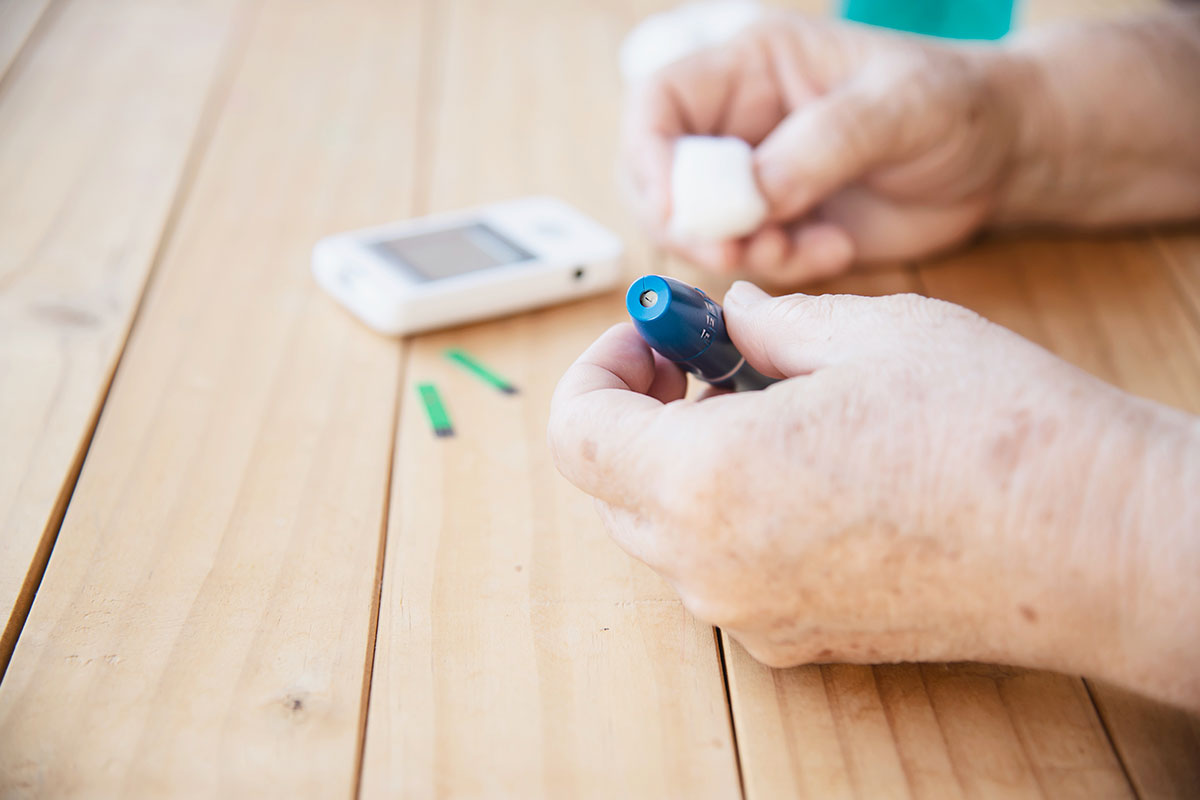
Diabetes: Precautions and Insulin Use in Elderly
By in Internal Medicine
Aug 31, 2020
Diabetes is spreading like a pandemic and has become a major health problem. The condition not only causes lifestyle issues, a prolonged diabetic condition can lead to various other health complications such as kidney problems, High BP, vision problems and also cardiovascular diseases which can lead to fatalities.
For those who are unaware of the condition and causes of Diabetes, it is a condition under which the blood sugar levels in our body rise due to non-production or insufficient production of Insulin by Pancreas. Regular blood sugar level checks at the best multispecialty hospital in India are required for early diagnosis of such conditions
There are majorly two types of Diabetes
- Type 1 Diabetes
- When your immune system destroys Beta cells in your pancreas that make insulin, the condition is identified as Type 1 Diabetes. Children and young people are more susceptible to Type 1, although it can appear at any age. Artificial Insulin doses become necessary for the survival of the patient affected by this condition.
- Type 2 Diabetes
- Type 2 is the most common type of Diabetes. When your body forms a resistance to insulin or there is insufficient secretion of insulin by Pancreas, the condition is termed as Type 2 Diabetes. This condition can develop at any age, however, middle-aged and older people are more prone to develop this condition. One should visit the best diabetes hospital in India for consultation by a specialist for the diagnosis of diabetes.
- Gestational Diabetes
- Sometimes during pregnancy women become diabetic, this condition usually subsides post-pregnancy. However, women with Gestational Diabetes are considered more prone to type 2 Diabetes. If you have suffered from Gestational Diabetes you should go for regular check-ups at a super-speciality hospital for prevention and control of post-pregnancy diabetic symptoms.
Other types of Diabetes include:
- Monogenic Diabetes- an inherited form of Diabetes
- Cystic fibrosis-related diabetes – this type of diabetes is caused by excessive mucus formation in Pancreas affecting Insulin secretion.
In India with the rise in the aging population, the incidence of Diabetes mellitus type 2 commonly known as Diabetes is on the rise both in urban as well as rural areas. As described earlier, Diabetes mellitus is a genetically inherited disease, by the time it gets manifest; a large number of beta cells which produce insulin get exhausted. As the age advances the beta-cell exhaustion continues leading to deficiency of insulin in the body. Along with this other factor like increasing insulin resistance, obesity, lipotoxicity, lack of physical activities, presence of co-morbidities & medication also plays a negative role in the elderly.
The co-morbidities like COPD (Chronic obstructive pulmonarydisease, a type of lung disease), cardiac failure, osteoporosis, osteoarthritis, chronic kidney disease, chronic liver disease, post-stroke scenario, cognitive impairment & lack of empowerment at workplace & society reduce the physical activity of the aged population thereby increasing BMI & reduced GFR also complicate the situation.
At this juncture besides control of blood sugar, other issues like lipid management, coagulation abnormalities, lowered immunity, etc. also require attention. All these factors make the management of Diabetes in the elderly a complex issue. If you are suffering from comorbidities (health complications apart from diabetes), you are advised to visit the best multispeciality hospital in India for a comprehensive check-up, to get a broader perception of your health condition and consultation.
Several issues can be considered as hindrances in providing proper therapies for diabetes control in the elderly. While considering various options for diabetes control the points mentioned below should be considered by diabetic patients and those who show the pre-diabetic symptoms.
Therapeutic Issues
Insulin as an anti-diabetic therapy through scientifically relevant may get delayed either because of socioeconomic reasons, prick fear of injections, or the experience of sugar control with OHAs.
When the sugar levels or HbA1C go up alarmingly or when complications like CKD, acute infections, ketoacidosis, need for surgery, failure of OHAs, etc. occur; one considers insulin therapy. However, the newer antidiabetic drugs (SGLT2 inhibitors) with their multiple pleiotropic effects may further delay the insulin therapy.
In the elderly, the goals include control of blood sugars, avoidance of hypoglycemia, care of lipid abnormalities, prevention of platelet aggregation, care of immune issues & control of existing comorbidities. In elderly, dental & digestive issues have also to be considered. Also as per the best diabetes hospital in India, the goals have to be modified in special situations like fasting & festivities.
Insulin Therapy
Artificial Insulin is the therapeutic agent which is at par with the biologically secreted Insulin as it replaces the relative deficiency that has occurred in the body. Insulin is the best option for treating this condition, however, it has side effects like hypoglycemia & weight gain. But with the constant development of newer delivery devices, they are now user friendly & have significantly lower side effects.
Caution: one should not take any medicine including Insulin without consulting the best diabetes specialist as it may further aggravate your situation.
Types of Insulin
There are ultra-short acting Insulins, short-acting Insulins, intermediate-acting Insulins, premix Insulins & long-acting/basal Insulins. The insulin prescriptions are always tailor-made depending upon age, BMI, GFR, food habits, lifestyle, economy, support system, presence of comorbidities & the present clinical situation. If you are suffering from diabetes or pre-diabetic symptoms, one must consult a diabetes specialist at the best multispeciality hospital in India for a customized prescription.
- Ultra-fast Acting Insulin
- They start acting within 1 -3 minutes of injection & lasts for 3 – 4 hours.
- The ultra-fast Insulins though limited but have a special role during surgery & ICU care.
- They also become important if the food habits are not regulated in terms of likes & dislikes of food, timings & sudden food craving situations.
- They are also important if the postprandial spikes are sharp.
- Short-Acting Insulin
- Their action starts within 20 – 30 minutes & lasts for 6 – 8 hours.
- They are usually needed if the food habits are changing or in hospitalized patients where the clinical scenario keeps changing.
- They are also important in pre & post-surgical times.
- Intermediate Acting Insulin
- With time their usage is declining.
- Premix Insulin
- They are available in various combinations of short-acting & long-acting insulin. These combinations may be 25/75, 30/70 & 50/50.
- Their selection depends upon the food habits of the patient.
- They are used twice a day or in select case may be used once a day also.
- Long-Acting Insulin
- The long-acting (basal) Insulins available currently have a “long” duration action (approximately 24 hours) or “ultra-long’ duration action (approximately 36 – 42 hours), necessitating injections maybe once every other day.
- Newer formulations with concentrated Insulins (300 IU/ml & 500 IU/ml) are also now available, which necessitate reduced dosages vis-à-vis 100IU/ml formulations.
- These also have relatively better hypoglycaemic profile especially when it comes to nocturnal hypoglycemia.
Insulin Initiation in elderly
Before starting the Insulin treatment for elderly patients, a lower dosage should be given rather than the usual calculation of 0.2 mg/kg body weight, again the dosage and type of insulin given to the patients should be as per the prescription of a diabetes specialist only. The patient/ the attendant should spend time educating or empowering them to titrate the doses also. It is better to remain in touch with your consultant rather than relying on a fixed chart carrying instructions given by the best diabetes consultant.
Usually, if patients fasting blood sugar is >250 mg or post-prandial sugar is >300 mg &/or HbA1C is >9.5 gm insulin is initiated. These are however not very hard & fast criteria. The titration of dosage in the case of basal insulin in the elderly is always gradual & being guided by the fasting sugar levels. The titration is done every third-fourth day by two units if the desired levels are higher by 20-30 mg/dl.
Note: Titration is a practice of quantifying the amount of insulin per dosage.
Insulin in Special Circumstances
There are certain situations in which the Insulin therapy requires aggressive monitoring & frequent adjustments. They include a grossly deranged metabolic state (CKD, CLD, ketoacidosis), infections, acute coronary & neurological events, surgery, post-transplant situations & fasting, etc.
Under most of the above situations, there is an important role of hydration in the body, nutritional requirement, urinary output, cardiac status & use of other drugs, etc. The usual choice is multiple dosages of ultra-short acting or short-acting Insulins. As the clinical scenario changes & the other drugs are either escalated or deescalated, the insulin requirement also changes. Get in touch with your diabetes consultant for more information at the best hospital in India.
Other Drugs
Metformin & other OHAs may be used along with insulin therapy. The care is taken in adjusting the dosage & taking care of hypoglycemia.
GLP 1 agonists are also used along with insulin in patients with higher BMI.
Lipid-lowering drugs in various combinations taking care of cholesterol, non-HDL cholesterol & triglycerides. Aging, Diabetes mellitus & lowered immunity are more or less equivalents, hence in elderly diabetics, every attempt should be made to boost the immune functions & prevent infections. Some guidelines advocate the use of certain vaccines in elderly diabetics, they include pneumococcal vaccine, influenza vaccine, T-dap vaccine & Herpes vaccine.
There are situations like fasting & traveling during which insulin dosage requires adjustments.
If one is diabetic or is sensing diabetic symptoms in their body, they should immediately get in touch with a super-specialty hospital for a complete check-up to rule out any other factors for the symptoms before going for diabetes treatment.
We at the metro group of hospitals are always committed to realizing the vision of providing world class healthcare at an affordable cost and to achieve excellence in Healthcare services by offering exceptional care through state of the art technology.
The Metro Group was established in the year 1997 by Padama Vibhusan, Padma Bhusan and Dr. B C Roy National Awardee Dr. Purshotam Lal with the vision to provide world-class healthcare amenities to his countrymen at an affordable cost.
Metro Group of Hospitals are the leading healthcare centers in our country boasting an ultra-modern infrastructure providing multispeciality care by an exceptional team of healthcare professionals under the leadership of world-renowned interventional cardiologist Dr. Purshotam Lal. We at Metro hospitals provide multispecialty care for 35 specialties that include Cardiology, Gastroenterology, Nephrology, Respiratory, Oncology, Orthopaedics Joint replacement, Gastro and Bariatric Surgery, Neurology and Neurosurgery, etc.
Dr. Purshotam Lal is a world-renowned cardiologist who has been trained at world’s top medical institutions in UK, Germany, and USA and has been granted fellowships at American College of Cardiology; American College of Medicine; Royal College of Physicians (Canada); Indian College of Cardiology & Society for Cardiac Angiography Interventions (USA). He has been constantly innovating and has provided the world with various procedures in the field of Interventional Cardiology. He has successfully implemented these procedures and has treated thousands of patients suffering from complex heart diseases.
He made monumental contributions in clinical development of Monodisc Device and for the first time in medical history performed Heart Hole (ASD) Closure on a patient from Tamil Nadu. Some of the other procedure that were performed by Dr. Purshotam Lal for the first time include:
- The first case of Aortic Valve Replacement with Core Valve, without surgery on July 12, 2004.
- The 1st case in high-risk Aortic Valvuloplasty in July 1990 for the 1st time in the Medical Literature.
- Introduced INOUE Balloon, the most popular balloon for opening tight valve, for the 1st time in the country.
- Developed a new concept of “METRO CORONARY SCREENING” for the patients who have been having a phobia of conventional coronary angiography.
- Introduced more than 20 interventional procedures for the first time in the country such as Coronary Atherectomy, Slow Rotational Angioplasty, Rotablator, etc.
- Performing the largest no of angioplasties/stenting as a single operator in the world – as per HEAL Survey – the leading health magazine.
His contributions in the field of interventional cardiology are numerous and he is constantly working to provide affordable healthcare to all.







